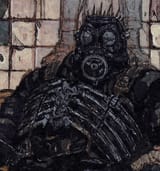>>720025367
> he wanted a shortcut to solutions rather than to put in actual time such changes would warrant
The motivation to jump straight to quick fixes is very slightly, imperfectly, but explained in the game (picrelated). However, the real reason why they are racing against time is not clear to me. What is clear is that the methods Vayne chose to implement the plan resulted in literally every political faction in the region rebelling against him and his vision. It was not a very smart move. Whatever the reasons for the methods chosen are, they proved unsuccessful, which is quite realistic: it is difficult to fight alone against several armies/factions at once.
>If Vayne was less extreme and more sensible he would've won.
Indeed. I think in vacuum, it was theoretically possible to resolve the situation diplomatically in a relatively short period of time, or at least to avoid war. Vayne could have tried to negotiate with all the parties, explaining why "history" needed to be reined by people, and the potential danger of the Occuria. The problem is that Vayne grew up in very harsh conditions: he was forced to kill his brothers and so on, and as a result, he developed the idea that all political problems can be solved with force, not words. The story of XII shows that it was his strength that ultimately turned out to be his vulnerability.
Vayne's story as a politician is in some ways a typical example of how in autocratic systems the psychology of the ruler significantly affects the strategy of decision-making. His psychology was rooted in a traumatic past, which brings us back to a recurring motif in the characters' stories in XII: there is some traumatic past that must be overcome and left in the past in order to move on. This motif is represented in the stories of most of the main characters. Vayne is the character who could not leave behind the old ways of solving problems, and, apparently, old traumas. Even his father succeeded in this, but not him
